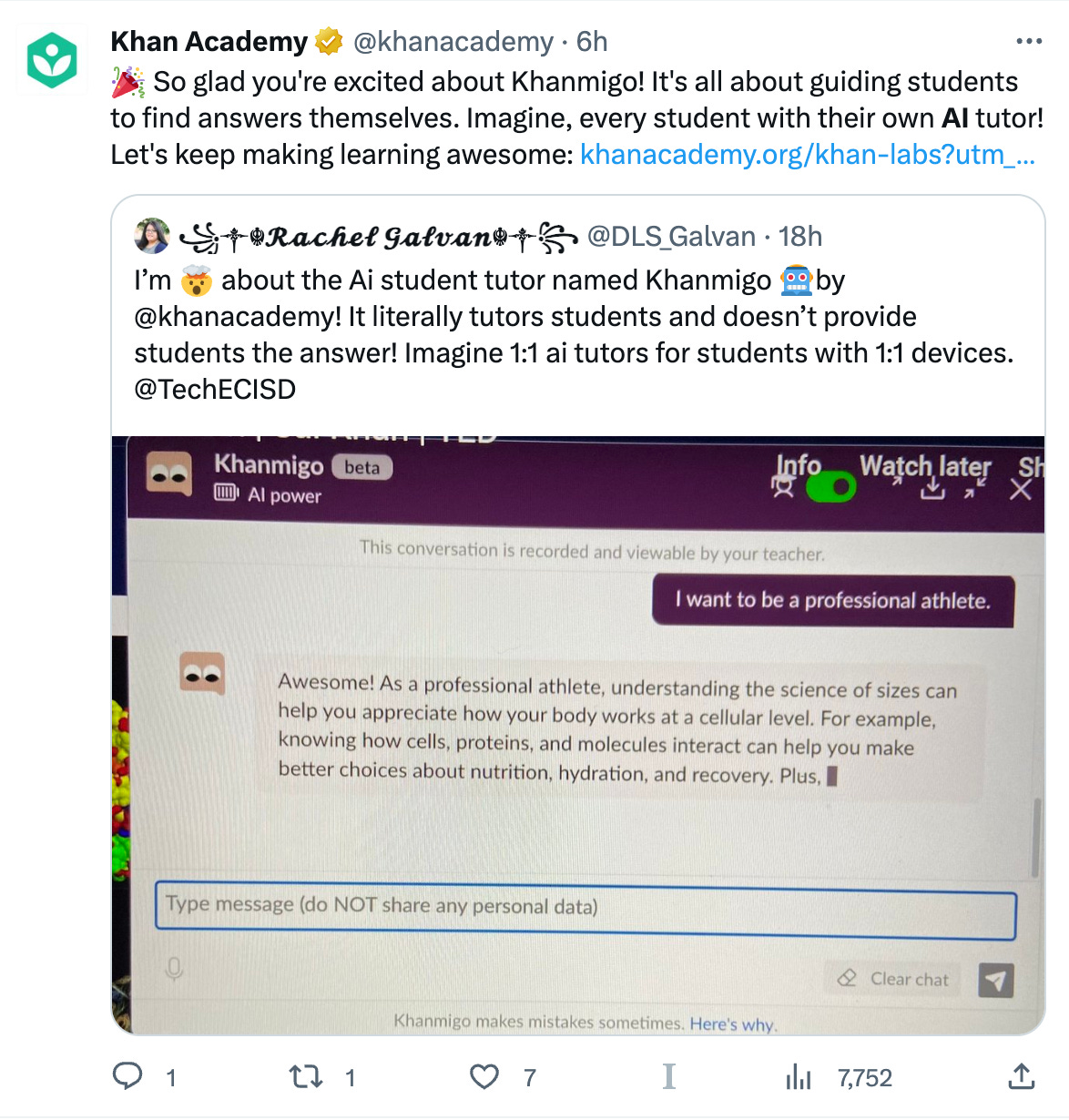Good day, good people.
I missed you guys last week. My fam went to Las Vegas for my daughter’s annual birthday trip. Short story: it was hot as actual hell, there were no water fountains even in the bougie hotel we stayed in, and the people on the strip resembled Grand Theft Auto.
Enough about that. I’m back.
Let’s talk about math. Last February, I challenged parents to conquer their math anxiety to be better helpers to their children.
Here’s what I said:
Commit to becoming as much of a mathematician as possible. Instead of hiding from the issue, make math a hobby and seek out all free tools available to build math competency. Many videos, podcasts and apps can provide additional support in tackling mathematical issues.
That was cute, especially since I hate math.
I've always had a nagging fear of it because I missed some critical math lessons back in the day, and now the way they teach it to my kids is like a puzzle missing many pieces.
It’s a shameful thing.
The universe sent me another message today about drinking my own Kool-Aid. While writing about the educational benefits of generative AI, this popped up in my feed:
Like a nagging friend, it called out to me to be about that math life. To commit. To use the wealth of tools available today that were never available in my younger years.
To have no excuses for why math and me have been estranged.
“Christopher, you can’t keep talking about education while dodging math like it’s a bill collector,” it said.
So, I took action this time (finally). I signed up for Khanmigo, the AI-driven tutor offered by Khan Academy (and no, they aren’t sponsoring this message, and I don’t know much about the product yet).
I’m only telling you this to build some accountability. I’m let you know how it’s working at a later date.
#FutureMathematician
Headlines
📱 Student speech. A Tennessee student makes memes of his principal and puts them online. His school has a policy that “prohibits students from posting images that embarrass, humiliate or discredit staff members or other students,” thus, the student is suspended. He’s now suing the school over it. We’ll see if the First Amendment stops at the schoolhouse door.
👨🏾🏫 Institutional decay. Americans are losing faith in higher ed and questioning the ROI on a college degree. While some conservatives celebrate this change, it can’t be good in the long run. Even if there is a declining value of college degrees, people with bachelor’s degrees make on average 84 percent more over their lifetimes than people with only high school diplomas. Bachelor’s degree holders put $278,000 more into their local economy than high school grads. But beyond the economic benefits, college grads are healthier, happier, more likely to remain married, more likely to be engaged parents, and more likely to vote. Finally, the most toxic and popular societal commentary on social media and YouTube comes from a list of college dropouts who channel their lack of stick-to-it-ness into careers entertaining other poorly educated, anti-intellectual dropouts. Unfinished learning is a scourge.
🏛️ Trans Win. The 7th U.S. Circuit Court of Appeals has ruled that transgender youth can continue to use bathrooms in accordance with their good-faith gender identity in Indiana, and it has rejected an effort by school districts to overturn a lower court's preliminary injunction. This means transgender youth in the state continue to have the right to access bathroom facilities, and policies barring them are blocked in states within the circuit's jurisdiction.
🍊 Sundown state. A majority of the members of the Florida work group that developed new standards for teaching African American history opposed the sections that have recently drawn criticism, including that middle schoolers be instructed that enslaved people developed “skills” that could be used for their “personal benefit,” three members of the work group said.
🌅 Sundown state II. Due to that Florida’s regressive race-baiting education policies, America’s oldest Black fraternity, Alpha Phi Alpha, has dropped that state as a convention spot.
💵 Unqualified immunity. Attending an Ivy League college or a prestigious institution like MIT is often regarded as a coveted opportunity, granting access to academic environments that have nurtured over 40% of U.S. presidents and 12.5% of Fortune 500 CEOs. However, recent analysis reveals that this opportunity favors privileged students regardless of their academic qualifications. The children of the top 1% of U.S. income earners are much more likely to receive this golden ticket.
🏃🏾♂️ Losing ground. Democrats, who once held a double-digit lead on trust in education, are now trailing Republicans (-3 percentage points) among all voters in four battleground states—Arizona, Georgia, Nevada, and North Carolina on this issue. However, Democrats are still outperforming their Republican counterparts regarding trust on other hallmark issues where Democrats have historically maintained strong advantages.
🧬 Finding family. American leaders visit an archeological dig site to find the remains of boarding school students. the Relatives have been observing as archeologists dig for students' remains at the site of a former Native American boarding school in central Nebraska
The Future Today
💻 U.S. Dept. of Ed. A new report “Artificial Intelligence and the Future of Teaching and Learning: Insights and Recommendations.” As AI gets more into educational tech, everyone needs to embrace its benefits while looking for potential problems. Finding a balance between using AI to boost education and staying cautious about any downsides is important for the future of teaching and learning.
💻 Brookings Institute. In a world experiencing a global learning crisis, where as many as 70 percent of 10-year-olds in low- and middle-income economies can’t read and understand a basic text, over 244 million children and youth are out of school, and there is a projected global teacher shortage of almost 70 million teachers by 2030, a new wave of AI-enabled educational technology innovations can’t come too soon.
💻 The 74. Teachers, policymakers, and the industry must not overlook student voices & concerns if they are to harness artificial intelligence effectively.
💻 Higher Ed. A survey by Cambridge student newspaper Varsity last month found almost half of all students have used ChatGPT to complete their studies. One-fifth used it in work that contributed to their degree and 7 per cent planned to use it in exams. It was the equivalent, said one student, of “dropping one of your cleverer mates a message” asking for help.
And so it begins (again)
Sharpen the pencils. Choose the backpacks. Start the calendaring voodoo. For many families, it’s back to school (again).
Here are a few facts about B2S spending from Capital One:
American families spent a total of $41.5 billion on K-12 back-to-school shopping in 2023.
Statistics indicate back-to-school and back-to-college spending combined will total $189.7 billion in 2028.
From 2019 to 2023, spending per child increased 15%; after adjusting for inflation, spending per child decreased 3.43%.
Homeschooling parents spend 15% less than the average household on back-to-school shopping.
Sustainable shoppers spend 36% more than the average household on back-to-school.
41% of shoppers plan to evenly split their back-to-school spending between online and in-store purchases.
Spending is spiraling upward:
Broadcast
I’m writing a post about over-parenting, which has me consuming a lot of pieces about parenting “styles.” The literature clearly supports the Authoritative style because it sets healthy boundaries and high expectations for behavior, but it is warm and caring, unlike Authoritarian parenting.
I took the topic to the Freedom Friday show with Sharif El-Mekki to see how this discussion impacts parents of color. How is the research different for us? Are we limiting our kids by passing on our fears and stuff? And, should schools teach a version of “family studies” that prepares young people to be good parents if they choose to reproduce?
Podcast
One (big) thing I appreciate about working with Branch Media to produce my podcast is that it stretches my thinking. Their motto is “Change minds. Start with your own.”
It’s such a provocative challenge.
My mind started changing rapidly during the pandemic. My views of education shifted. Whereas I was so much of a rigid school choice adherent that I considered those who disagreed with me enemies, I saw that there was nothing productive in that way of being. No problems are solved by being so entrenched in an intellectual camp that we lose sight that the people we spar with about policy are actual people. And conversely, not all the people in your own camp are without serious and sometimes insurmountable anti-social motivations.
Accepting my cancelation from the church of private school choice allowed me to connect with education advocates who I couldn’t have connected with a couple of years ago.
Two of those people are Josh Cowan, the voucher critic in Michigan, and Beth Lewis, the leader of Save Our Schools in Arizona. Neither of them are fans of private school choice. It shows plenty of growth on my end that they could come on The Citizen Stewart Show as people who disagree with me but are not enemies. I previously had Robert Enlow from Ed Choice, Neal McCluskey from CATO Institute, and Adam Peshek from Stand Together Trust on the show to discuss choice, so last week’s shows added balance.
Additionally, I’m excited because we had Former Secretary of Education Margaret Spellings on the show this week! Ravi Gupta filled in for me (remember, was in the Nevada hellscape).
Check out that show here:
Au Revoir
Thank you for reaching. Be well.
Chris










